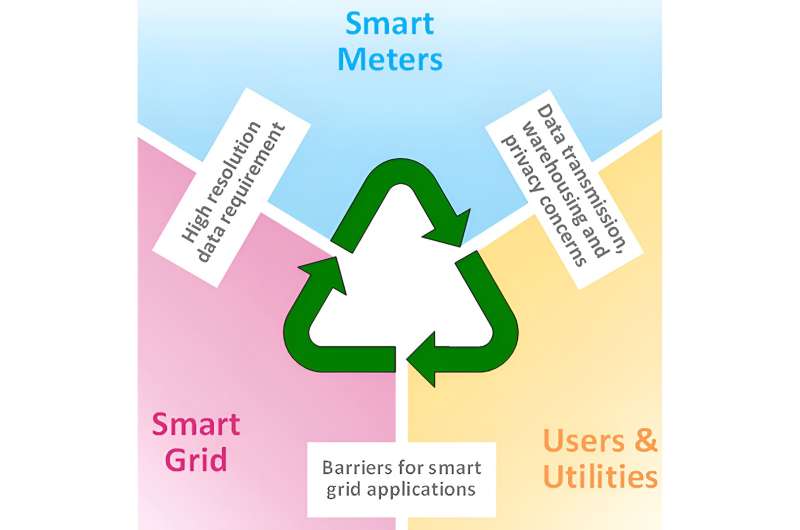
Researchers on the College of Adelaide imagine the worldwide funding being made in sensible metering infrastructure may fall in need of fulfilling promised advantages to clients if key methods points usually are not addressed.
Throwing open the problem to different vitality methods researchers, Dr. Ali Pourmousavi Kani from the College’s College of Electrical and Mechanical Engineering, says sensible meters and sensible metering methods require a brand new degree of sophistication if they’re to play a helpful position in supporting extra environment friendly vitality use and sensible functioning grids.
Analysis from Dr. Pourmousavi Kani’s staff, led by Ph.D. candidate Rui Yuan, examined the information which might be gathered from vitality methods in Australia, Europe and North America.
The staff’s findings, published within the journal Cell Stories Bodily Science, reveal insufficient sampling decision and frequency of communication of electrical energy consumption information, and a failure to handle a spread of knowledge points comparable to information warehousing and privacy concerns.
“Points with information gathering from energy systems current important handicaps to the emergence of actually sensible grids,” Yuan says.
“In Australia and all over the world there’s a push to put in new and sensible digital meters which have the capability for two-way communication to the grid.
“As an illustration, the Australian Power Market Fee (AEMC) has advisable 100% uptake of sensible meters by 2030, and the EU expects 225 million sensible electrical energy meters to be put in by 2024.
“Nevertheless, most sensible metering infrastructure would not but have the capability or shouldn’t be operated to speak consumption information in additional than half-hour to 1 hour sampling decision in actual time and feed that again to customers and repair suppliers.”
The standard of vitality consumption information relies on the frequency that it’s collected: increased frequency of assortment offers a greater image of consumption patterns.
“Huge guarantees got here together with the push to digitize the vitality grid, together with many advantages to customers from options that may permit them to watch their vitality use and make decisions to choose into higher providers that might be supplied by third events,” says Yuan.
“Within the U.S. lower than 3% of sensible meters can ship on these guarantees, and globally the state of affairs is comparable.”
For instance, Yuan says, the European Fee reported that 7 out of the 16 international locations present process widespread deployment of sensible meters lacked the power to even relay consumption information again to customers, and in elements of Canada, wi-fi sensible meters are solely learn each 30 or 60 days in keeping with the conventional manually-read billing cycle.
The analysis staff touched on a number of obstacles to growing excessive functioning sensible metering infrastructure.
“In Europe we discovered that smart meters didn’t have the bandwidth required to transmit the massive quantities of knowledge for top decision readings and in elements of Asia there have been points with sluggish communication hyperlinks,” Kani says.
“One other disincentive to capturing and conserving excessive decision energy-use information is the price of information warehousing.
“Knowledge warehousing is estimated to price between US$19,000 and US$25,000 yearly per terabyte, so any push to extend energy-use information decision from say an hour to each two seconds has a multimillion-dollar price hooked up.
“There are pitfalls to gathering high-resolution real-time information from customers as a result of it additionally leaves them weak and opens up difficult privateness points.
“Monitoring the information offers data indicating when individuals are dwelling or out and the way typically—so it reveals occupancy patterns.
“It may additionally recommend sure sorts of felony exercise—for instance the cultivation of unlawful crops and there are examples of regulation enforcement companies utilizing such information of their investigations.
“If the data is hacked it opens up a spread of security, moral, and privateness points for customers.”
Kani says the analysis staff has labored to develop a brand new strategy to sensible metering which will supply options to the three key issues inherent in present methods—information transmission, information warehousing, and information privateness.
“Our resolution, whereas nonetheless in its early phases of improvement, goals to allow high-resolution information capturing,” he says.
“This know-how not solely prioritizes shopper privateness but additionally ensures cost-effective information storage and low communication bandwidth requirement.
“The final word purpose is to empower customers to totally reap the advantages of sensible metering infrastructure.”
Extra data:
Rui Yuan et al, Unleashing the advantages of sensible grids by overcoming the challenges related to low-resolution information, Cell Stories Bodily Science (2024). DOI: 10.1016/j.xcrp.2024.101830
Quotation:
Path to decrease emissions calls for a wiser grid, say researchers (2024, February 22)
retrieved 23 February 2024
from https://techxplore.com/information/2024-02-path-emissions-demands-smarter-grid.html
This doc is topic to copyright. Aside from any honest dealing for the aim of personal examine or analysis, no
half could also be reproduced with out the written permission. The content material is supplied for data functions solely.







